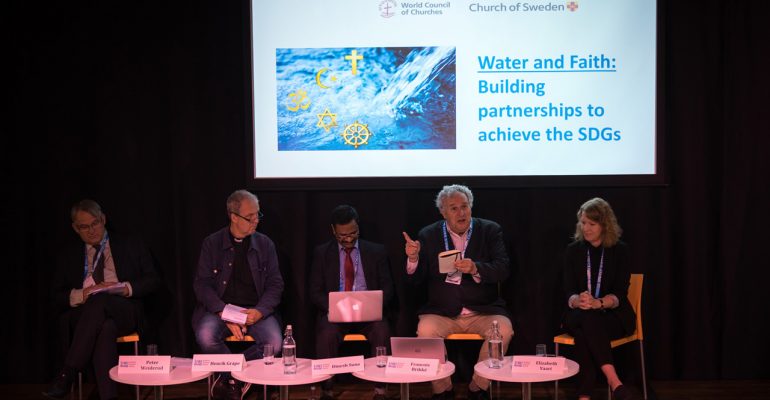“One thing is clear, faith communities can be a tremendous driver of change”
September 3, 2017 2023-07-15 12:03“One thing is clear, faith communities can be a tremendous driver of change”

“One thing is clear, faith communities can be a tremendous driver of change”
Gathering at World Water Week in Stockholm, Sweden on 30 August, representatives from a range of faith communities and organizations engaged in water issues held a session exploring how faith communities can help achieve the sixth Sustainable Development Goal (SDG), ensuring availability and sustainable management of water and sanitation for all.
The session, entitled “Water and Faith: Building partnerships to achieve the SDGs” was the second consecutive one on faith and water at the annual World Water Week. By showcasing a range of good practices by faith communities done to help achieve the SDGs on water and sanitation, it highlighted the importance of working together, within church traditions, ecumenically and in engagement between faith communities and the water community at large.
Reflecting on the role of faith engagement in achieving the SDGs, Rev. Henrik Grape, of the Church of Sweden and coordinator of the World Council of Churches (WCC) Working Group on Climate Change, said, “We have sometimes thought in the past that for many climate and water issues, technology will come to the rescue in the end. But we see today that while there are a lot of hopeful developments in the area of technology and environmentally-friendly solutions, we also need value-based organizations and communities to act as a driving force, to act and achieve changes in our behavior and habits.”
The theme of water runs through many of the world religions, the participants observed, and faith leaders rarely need to be convinced of the importance and sacredness of water as a source of life. Instead, a key point of focus should be on strengthening the many concrete water projects run by faith communities across the world.
The session was organized by the WCC Ecumenical Water Network in collaboration with Church of Sweden, Global Water Partnership, Stockholm International Water Institute, and Swedish Institute Alexandria.
Source: World Council of Churches








